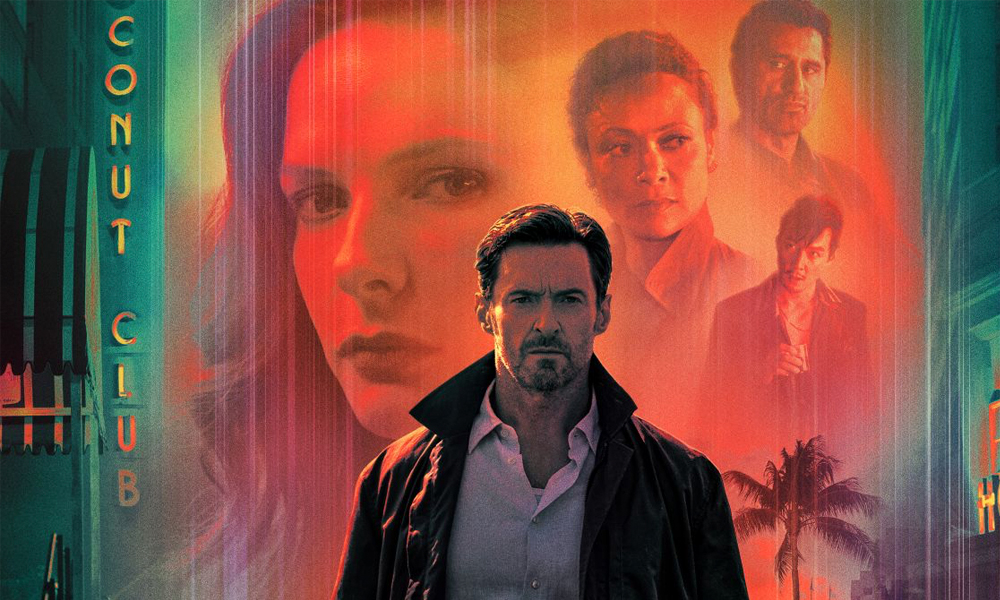Reminiscence, ironically, takes place in the future, when society has collapsed with the climate and cities have adapted to sitting half-underwater. There’s a capitalist caste system where the rich get dry land and the poor live at an ever-rising sea level—but forget about that for now, says Hugh Jackman’s voiceover, hurriedly moving to the next concept—there’s also a sci-fi dream machine that lets people relive their memories. Jackman’s narration describes the machine while his character, Nick, operates it on-screen, giving us a double dose of “this is how our sci-fi works” exposition. He also says the words “the past is a bead on the necklace of time” with deadly seriousness. This intro is a pretty good indication of how the rest of the movie is going to go.
READ ALSO: Review: ‘Logan’ ends an era on a high-note
The film’s color palette gives away its genre. High contrast; dark, saturated colors; neon and chrome breaking up the shades of grey—this is neo-noir, all the way down to the gloomy private eye and the femme fatale. Before he worked in the nostalgia business, Nick used his memory machine to interrogate persons of interest, a practice he returns to when his mysterious lover Mae (Rebecca Ferguson) disappears without a trace. Ignoring the advice of business partner and fellow war vet Watts (Thandiwe Newton), Nick descends into Miami’s watery underbelly to unravel a conspiracy that Mae was tangled up in.
The screenplay features some clever constructions, particularly when we’re not sure if we’re watching a memory or seeing something play out in real time. But it’s bereft of character. An early scene is suggestive of how Reminiscence loses its characters in the plot: Nick is helping the DA search the memories of a dying felon, hoping to get a glimpse of the drug lord he works for. The scene starts with them setting up the procedure, but then immediately cuts to 12 hours later, the prosecutors complaining that they’ve gotten nowhere. It’s right then that Nick realizes how to pinpoint the exact memory they need. Showing us the intervening 12 hours could’ve given us insight into Nick’s character—his patience, his drive, his process. Instead, we jump from plot point to plot point, cutting only to the next building block of the story falling into place. There’s no texture to these characters, no detail. Nick’s endless voiceover narration—a masterclass in explaining the obvious, sometimes twice or thrice over—belies whatever humanity he might’ve had. He’s an exposition vessel in love with a plot device.
The world of the film is similarly lacking, even when it’s a stunner on the visual level. Details have been thoughtlessly glossed over. In an interrogation context, it makes sense that the memory machine’s operators get to watch the experiences being relived—but Reminiscence never bothers to address how paying customers get past that fact. If you want to relive your wild prom night, you’d better be okay with Hugh Jackman leering at the proceedings (which, come to think of it, might be the main draw for his customer base). The setting and story, though, for all their clunkiness, are no match for the dialogue. Every character speaks in ludicrously affected prose, straining to sound smart and important at the expense of not sounding laughable. It’s the kind of writing you’d expect to find in a parody of film noir. It’s spectacularly bad, to the extent that it tunnels out the other end and into comedy gold. Reminiscence is quotable for all the wrong reasons.
As the time-obsessed Rube Goldberg machine of a plot tinkers towards its endpoint, the impending big reveal becomes the only thing that matters—and it barely makes an impression beyond plugging up plot holes. The story takes puzzle pieces built to fit together, fits them together, and mistakes that for profundity. But it’s just machinery. And it falls apart at the hinges when the ending tries to tie into the political aspects at the film’s fringes. Reminiscence is a grueling paradox of a movie: each scene takes the shortest route between plot developments, but each line is the longest, most awkward way to get a simple thought across. It really does find a way to bend time.
½ (0.5/5)




